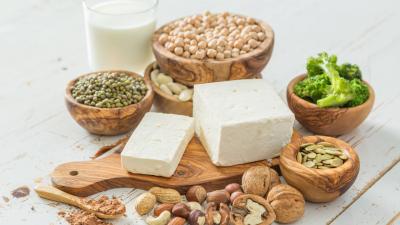The Protein Myth Terminator

Can you really beef up without any beef? Yes, according to Arnold Schwarzenegger. Shock rang out earlier this week when one of the world’s most famous bodybuilders put out a surprising call to action: It’s time to eat less meat to save the planet.
Can you really beef up without any beef? Yes, according to Arnold Schwarzenegger. Shock rang out earlier this week when one of the world’s most famous bodybuilders put out a surprising call to action: It’s time to eat less meat to save the planet.
Headlines wondered how a former bodybuilder could discourage meat consumption. What about protein?
In response to this persistent protein myth, Schwarzenegger told BBC: "Luckily we know that you can get your protein source from many different ways, you can get it through vegetables if you are a vegetarian. I have seen many bodybuilders that are vegetarian and they get strong and healthy."
He’s right. More and more, bodybuilders and other athletes are proving that you don’t need meat to make muscle. This year alone, we’ve seen plant-based ultramarathoner Scott Jurek become the fastest person to ever race through the 2,189-mile-long Appalachian Trail, breaking the world record by running approximately 50 miles per day for 46 straight days. Football player David Carter made headlines as the NFL’s “300-pound vegan,” while bodybuilder Torre Washington and the “world’s strongest man” Patrik Baboumian continued to prove that it’s possible to pump up with plants.
How are they doing it? A diet rich in various grains, legumes, and vegetables provides all of the protein our bodies need, without the large amounts of saturated fat and cholesterol found in animal foods. Just one cup of lentils contains 16 grams of protein, while a cup of quinoa contains about 11 grams. Even a cup of broccoli has more than 4 grams of protein.
While fad diets often lead people to believe that they’re not consuming enough protein, in reality, most Americans are at far greater risk of consuming too much. People who follow the standard American diet – filled with meat and dairy products – often consume about twice as much protein as they actually need. One recent study linked diets rich in animal protein to early death, while other studies show links to heart disease, cancer, osteoporosis, and other conditions.






